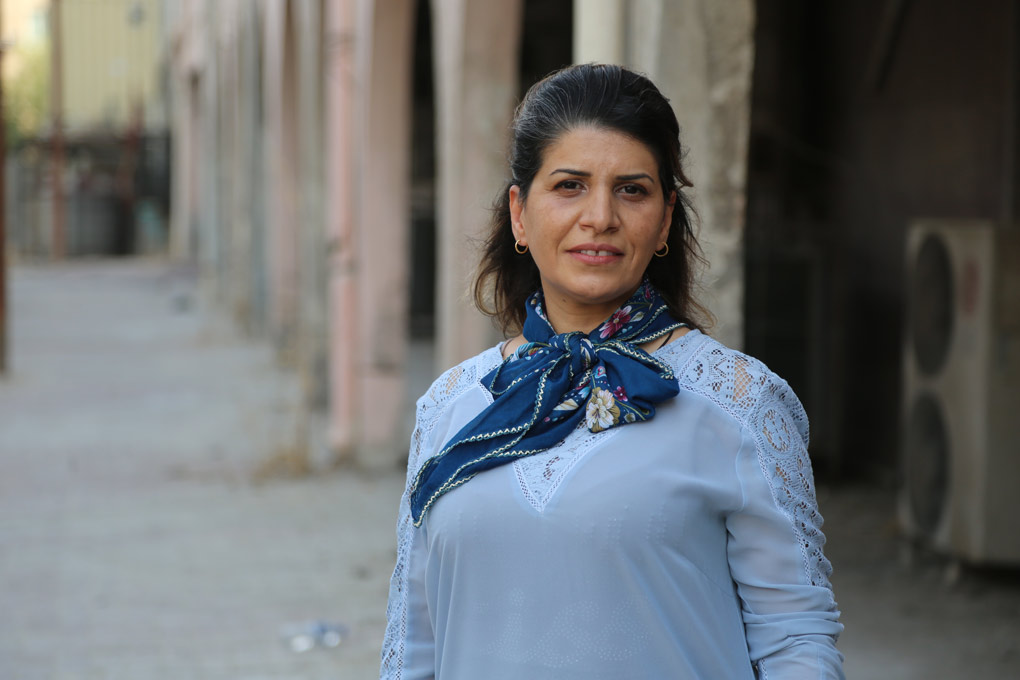”I have to show my strength”
It’s been more than one year since Intisar Al-Amyal was awarded with the Swedish government’s prize for democracy and human rights. The Iraqi women human rights defender shares her thoughts on working under both pandemic and constant threats.

She was overcome with joy when she received word. At the same time, anxiety grew. Would the international recognition infuriate those who already threatened her? When it became known that Iraqi women’s rights activist Intisar Al-Amyal would receive the Per Anger Prize, the Swedish government’s prize for democracy and human rights, she stayed away from Baghdad.
“Before I received the award physically, there were some threats against me. My home was visited by national security forces. But there were also many who were happy,” says Intisar.
With bright eyes, she says that the award has given strength to many young women to continue the fight.
“It was almost like a carrot for them, ‘wow, we have received international recognition’, and that is very important. When other organisations go to government agencies to pursue women’s rights issues, I am used as a reference: ‘look, she has received an international award’. It shows that women in Iraq are a resource.”
Efforts to reach the most vulnerable
Intisar works at one of The Kvinna till Kvinna Foundation’s partner organisations in Iraq—Iraqi Women’s League. The organisation works with women and children who have been subjected to gender-based violence.
Like many other human rights organisations, they have had to adapt during the pandemic. When many were ill, the staff went out into neighborhoods which weren’t reached by health care efforts and handed out face masks and hand sanitisers and trained people in how to reduce the spread of covid-19.
“We have also distributed financial support to families who have lost their income. Women who are single and sole supporters of their families needed food and money. We have tried to help them as best we could,” says Intisar.
Threats become part of everyday life
When asked what it is like to live under threat, Intisar makes a comparison to how we all went through a normalisation process during the pandemic:
“Living under threat is not a normal condition. But over time, it becomes almost mundane. The normalisation process enters and takes over so that we can survive and not lose our ground. Just like the pandemic. People panicked in the beginning and now we have found ways to handle the situation,” says Intisar.
She continues:
“You try to continue your work as if you weren’t under threat. I maintain a facade where I don’t show if I’m afraid or worried. If I did, I’d scare those who look up to me. I have to show my strength. And when I talk about the fight, I forget the threats. Then I feel strength and courage, and that is what makes people listen to me.”
Intisar emphasises how important it is that Iraq doesn’t become a country where people, once again, are afraid to speak out, gather or demonstrate.
Protection for women’s rights activists
After the autumn elections, with a record low turnout, Iraq has a temporary government and that makes the situation for women human rights defenders in the country even more uncertain, Intisar says.
“We would need protection and support from the state to counteract the forces that are trying to kill, silence or stop us.”
She also wishes that there would be a stronger commitment internationally to provide support and protection to women’s rights activists. The demands placed on those who are under threat are unreasonable. The burden of proof is too heavy.
“It feels like there is a concern from other countries, that if they would give us human rights activists protection, we would migrate to their countries,” says Intisar.
Diminishing of militia power
Despite the political situation, Intisar feels hope for the future. Not least because of the young population.
“They don’t accept the reality we are in right now. There are many who want to ensure that the legislation we actually have, which protects equality and human rights, is implemented. The fact that young people are now making demands is the fruit of many years of work with demonstrations and riots,” says Intisar.
She feels that they are “in the middle of change” where the power of militias is diminishing and more people are turning to civil society to learn about democracy, human rights and peace work.
“In that fight, everyone is needed. Today, someone who can’t read or write can instead publish a video on social media to tell her story and raise awareness. A person can film and show ‘this is my children’s school, this is the way from home, look at how much water that has flooded across the road, is it really acceptable for children to go in this to get to school’,” says Intisar.
Kvinna till Kvinna has worked for women’s rights in Iraq since 2005 and we have an office in Erbil. We support and work with several local women’s rights organisations, including Iraqi Women’s League, to strengthen women’s human rights.